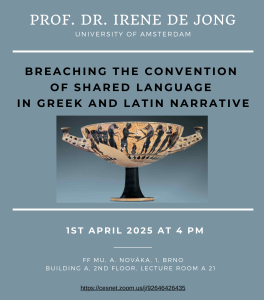https://cesnet.zoom.us/j/92646426435
Anotace: It is a convention to be observed across ancient narrative that people belonging to different cultures simply speak the same language, which is the language of the author and his readers. The rationale behind this convention of shared language as I have dubbed it is easily understandable and foremost practical: readers should be able to understand what is said by foreign characters too. However, occasionally ancient narrative authors do flag language differences, e.g. in the speech introduction or through references to interpreters. Examples have been collected by historians and sociolinguists, but in my paper, I will approach the phenomenon from a literary point of view. My working hypothesis is that references to language differences, exactly because they are so rare, are not random. They are contextually relevant and may have various narrative effects.

